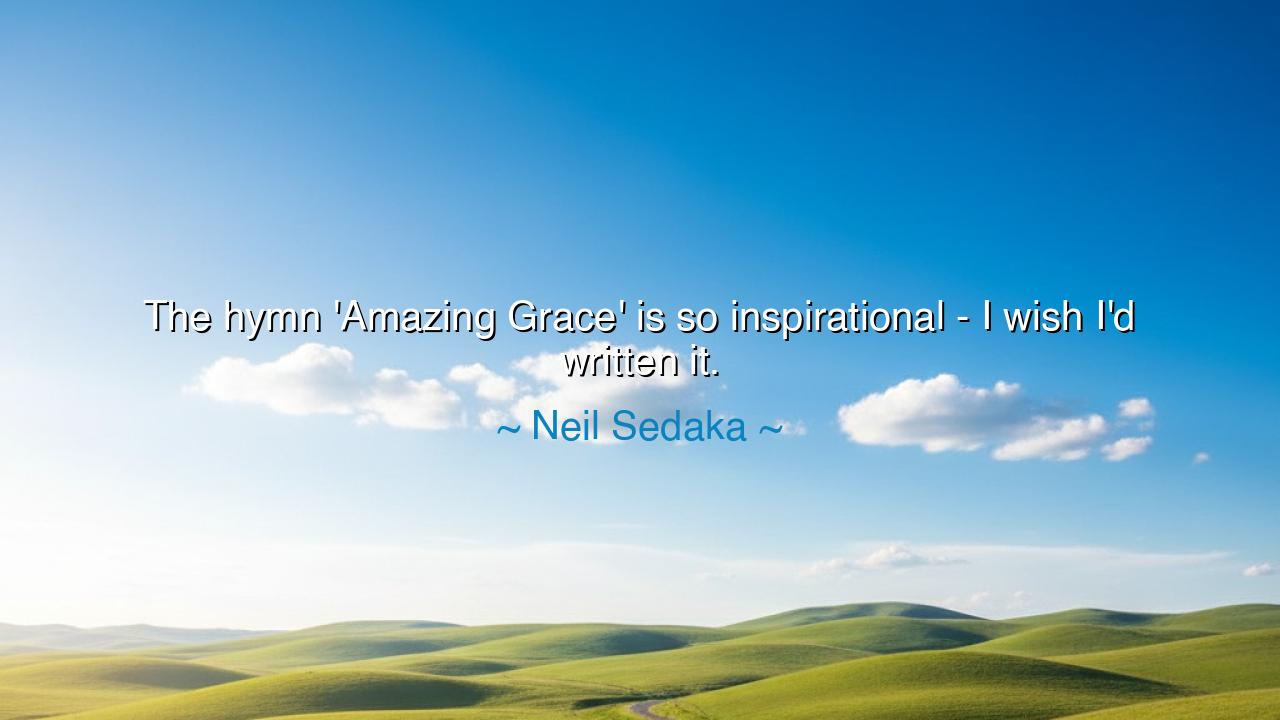
The hymn 'Amazing Grace' is so inspirational - I wish I'd written






In the vast tapestry of human expression, there are few works that carry the weight of inspiration as profoundly as the hymn "Amazing Grace." Neil Sedaka, reflecting on this timeless piece, says, "The hymn 'Amazing Grace' is so inspirational – I wish I'd written it." These words, spoken by one of music’s greats, capture the essence of humility and awe in the face of something so universally moving, so deeply rooted in the human experience, that it transcends time, culture, and belief. "Amazing Grace" has become a hymn not just of religious devotion, but of redemption, hope, and forgiveness, speaking to the soul's deepest yearnings for grace and transformation.
The hymn's origin speaks to a time of great change and reflection. Written by John Newton, a former slave trader who found redemption through faith, "Amazing Grace" is a song born out of personal transformation. Newton, like the ancient heroes who fell and rose again, embraced the power of change. His life story, marked by sin and repentance, mirrors the classic arc of redemption found in the great stories of old, such as the biblical transformation of Saul to Paul, or the Greek myth of Odysseus, who returned home after a long journey, forever changed by the trials he faced. Newton's experience, like that of these ancient figures, serves as a reminder that the human soul can always find grace, no matter how far it has fallen.
When Sedaka reflects on the hymn's power, he is speaking to something universal—that yearning for redemption, for grace, that resonates deeply within us all. "Amazing Grace" has not only withstood the test of time, but has continued to offer comfort and strength to generations. Its message of hope, that even the lost can be found, that even the blind can see, speaks to a universal truth that connects all of humanity. The ancients too recognized the power of such transformative stories. The epic of Gilgamesh, though written thousands of years ago, still carries with it a message of seeking redemption, of learning from one's flaws, and of seeking grace in the face of life's trials. Just as Gilgamesh’s journey was one of self-discovery, so too is Newton’s journey reflected in the words of "Amazing Grace."
It is no wonder that Sedaka, an artist who has created music that resonates with countless individuals, would recognize the power of "Amazing Grace." The hymn’s simplicity, its humility, and its raw emotion resonate deeply with those who seek to create something that connects with the heart of humanity. Art, whether in music, poetry, or painting, finds its deepest power in honesty and truth. "Amazing Grace" speaks to the human condition, to the struggle and redemption that we all face, and in doing so, it becomes a song for everyone—not just the religious or the pious, but the broken, the lost, and the hopeful.
As we consider the impact of such a simple yet profound hymn, we are reminded of the power of authenticity and vulnerability in art. The most inspirational works are not necessarily the ones with the most complex melodies or elaborate arrangements, but those that speak directly to the heart. In this, "Amazing Grace" teaches us that grace—whether it is divine or human—is found in the quiet, humble moments, not in the grandiose. Sedaka’s admiration for this hymn reflects the timeless truth that the most inspirational works are those that speak to the soul and reveal the deeper truths of the human experience.
The lesson from both Newton’s creation of the hymn and Sedaka’s appreciation of it is clear: the most powerful acts of creation come from a place of humility, authenticity, and truth. To create, whether through music, art, or words, is to open one’s self to the world, to express the truth of one’s struggles, redemption, and hopes. The most lasting creations are not those that are polished to perfection, but those that speak directly to the heart—those that connect us to something greater than ourselves, just as "Amazing Grace" continues to do.
To future generations, remember this: seek to create not for fame or recognition, but for the truth and grace that you carry within you. The world will always hunger for authenticity, for works that resonate deeply with the human soul. Like John Newton, Sedaka, and countless other artists who have given the world their gifts, let your work be an offering to the world, born from honesty, humility, and grace. Whether it is a song, a poem, or a simple act of kindness, it is the genuine expression of your soul that will have the greatest impact. And in doing so, you will inspire others, just as "Amazing Grace" continues to inspire all who hear it.






AAdministratorAdministrator
Welcome, honored guests. Please leave a comment, we will respond soon